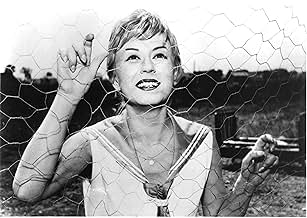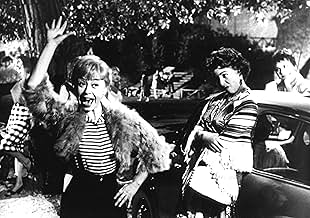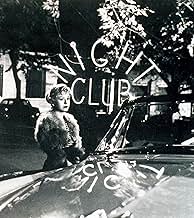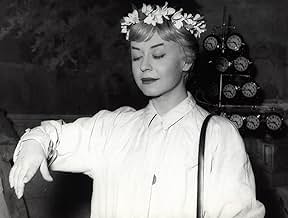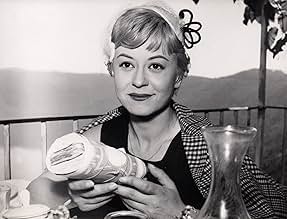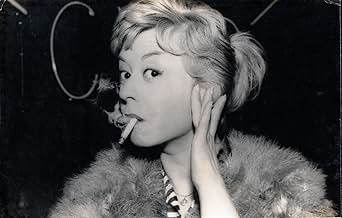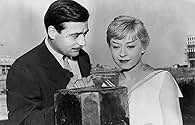IMDb रेटिंग
8.1/10
55 हज़ार
आपकी रेटिंग
अपनी भाषा में प्लॉट जोड़ेंA waifish prostitute wanders the streets of Rome looking for true love but finds only heartbreak.A waifish prostitute wanders the streets of Rome looking for true love but finds only heartbreak.A waifish prostitute wanders the streets of Rome looking for true love but finds only heartbreak.
- 1 ऑस्कर जीते
- 17 जीत और कुल 7 नामांकन
François Périer
- Oscar D'Onofrio
- (as François Perier)
Franco Balducci
- Spectator on the Stage of the Cinema
- (बिना क्रेडिट के)
Ciccio Barbi
- Man on the Stage
- (बिना क्रेडिट के)
Luciano Bonanni
- Pascello
- (बिना क्रेडिट के)
Loretta Capitoli
- Rosy
- (बिना क्रेडिट के)
Amerigo Castrighella
- Hypnotised man
- (बिना क्रेडिट के)
Leo Catozzo
- The Man with the Sack
- (बिना क्रेडिट के)
Dominique Delouche
- Priest with the Flag
- (बिना क्रेडिट के)
फ़ीचर्ड समीक्षाएं
10RG-5
As a film-lover, there are movies that I've outgrown, movies that disappointingly lose their connection to me as I age and mature. Fellini's "Le Notti di Cabiria" is one of those movies that seems to grow with me. It grows richer with each yearly viewing. I never tire of it; I am moved in different ways each time I see it. Fellini and his amazing muse, Giulietta Masina, created one of those rare movie masterpieces in 1957 that comments on its time, yet remains fresh and contemporary as well. But I lament that this gem is so little known today. I trust its recent restoration will help remedy the movie-going public's oversight. The film's rich concluding scene alone (and Masina's glance into our eyes) remains one of the most magical moments ever projected on a screen.
I would not argue that there could be better films made before and after Cabiria. Perhaps. But there never will be another "Nights of Cabiria" - the last Fellini's film with the linear structure, his third and the most successful collaboration with his actress wife, Giulietta Masina, his immortal love letter to her. Of all his characters, Fellini once said, Cabiria was the only one he was still worried about. Of all the characters, I've seen in the films, Cabiria is the one I often think about - what ever happened to her? Did she survive? Was she able to find love?
I've never seen the face so alive, changing its expression every moment. If the face is the soul's mirror, Cabiria's (Masina's) face reflects her every single emotion and how effortlessly she goes from bitter cynicism to wistful yearning, from despair to hope, from tears to smile. While there's life there's hope. As long as Cabiria smiles in the end of this tragicomic masterpiece, there is hope for all of us.
I've never seen the face so alive, changing its expression every moment. If the face is the soul's mirror, Cabiria's (Masina's) face reflects her every single emotion and how effortlessly she goes from bitter cynicism to wistful yearning, from despair to hope, from tears to smile. While there's life there's hope. As long as Cabiria smiles in the end of this tragicomic masterpiece, there is hope for all of us.
It's hard to tell which Fellini's film leads the way; "8 1/2", "La Dolce vita", "La strada", "Amarcord" and so many more, you just can't choose.
But, when it comes to this beautiful picture, things become clearer. It's not just the amazing perfomance by Giullietta Masina, it's not just the wonderful, semi-crazy characters wondering around the screen and emphasizing Kabiria's sad and lonely world, it's -and that's the film's greatest quality- this sense of optimism that Fellini wants the viewer to take with him/her as he/she is leaving the theater. The master takes everything from his heroin but at the end he wants to convey one simple, eassy-to-grip but so essential message: "Please, don't give up". The power of the film's last ten minutes is unpreceded in the world of movies and, sad to say, never again have we seen such an amazing finale. This is a must-see film, and, most important of all, a film so generous to its viewers that one time is not enough. A total 9/10
But, when it comes to this beautiful picture, things become clearer. It's not just the amazing perfomance by Giullietta Masina, it's not just the wonderful, semi-crazy characters wondering around the screen and emphasizing Kabiria's sad and lonely world, it's -and that's the film's greatest quality- this sense of optimism that Fellini wants the viewer to take with him/her as he/she is leaving the theater. The master takes everything from his heroin but at the end he wants to convey one simple, eassy-to-grip but so essential message: "Please, don't give up". The power of the film's last ten minutes is unpreceded in the world of movies and, sad to say, never again have we seen such an amazing finale. This is a must-see film, and, most important of all, a film so generous to its viewers that one time is not enough. A total 9/10
My friends went to see The Queen last night - I was too tired and decided to go back home. I put in the DVD and got into bed figuring I would watch an half hour or so and fall asleep. At the end of nearly 2 hours, I was sitting up straight, wide awake, awestruck at the genius in the direction and acting. This is cinema at its finest. I have seen La Strada before and I now rank Fellini's earlier work as among my all time favorites (along with Ozu.) Masina's tearful smile at the camera at the end is pure magic - so much dignity and hope captured in a single second. Her performance throughout the movie was a revelation - she got innocent hope and graceful charm to shine through her foul-mouthed vulgar acting character. I simultaneously cared and despaired for her - this movie pulled me in like no recent Hollywood movie has for a long long time.
10jotix100
Federico Fellini, the genius of the Italian cinema left his imprint in all the films he directed for all of us to enjoy forever. "Le Notti di Cabiria" stands as one of his best because of the character of that invincible woman at the center of the story: Cabiria! Having recently seen the excellent copy that was shown at NY's Film Forum, this is a film that like good wine gets better with age.
Fellini was the man whose idea was translated for the screen with his usual collaborators, Tulio Pinelli and Ennio Flaiano. Pier Paolo Passolini contributed to some of the dialog. Essentialy, this is a timeless tale of a woman that despite adversity, bad times, and all that is wrong around her, keeps her chin up and never begrudges a thing. In fact, Cabiria, despite of her profession, is a woman with a highly moral character.
The film takes us back to another, more innocent era. We are shown a prostitute with a heart of gold who is always cheated by most of the men who comes in contact with her. Cabiria is never resentful, or bitter at the hand life throws her way.
One of the best realized sequences of the film involves Cabiria being picked up by a handsome and popular actor, Alberto Lazzari. Alberto is about the only one in the movie that treats Cabiria with any semblance of warmth. Unfortunately, nothing happens between them because Alberto's lover, the gorgeous Jessy, arrives at Alberto's apartment to claim what's hers, leaving Cabiria shut up in a bathroom. If only her friends could see her then! Nobody would believe it!
There is not a moment out of place in the film. Of course, Fellini had the incomparable Giulietta Masina playing the leading role. Ms. Masina is just too wonderful for words. She makes us believe she is Cabiria, and that's that, which in itself it's something other actresses try harder, without the same results. Ms. Masina's face reveals all that is going on within Cabiria. Together with all her other creations in other Fellini's films, this is perhaps her own triumph as an actress.
Franca Marzi, who plays Cabiria's best friend, is also excellent. Amadeo Nazzari is perfect portraying the matinée idol, Alberto Lazzari. This was one of his best appearances in a distinguished career in the Italian cinema. The rest of the cast is wonderful.
Fellini's masterpiece is a film that satisfies any time one sees it thanks to his vision and the presence of Giulietta Masina.
Fellini was the man whose idea was translated for the screen with his usual collaborators, Tulio Pinelli and Ennio Flaiano. Pier Paolo Passolini contributed to some of the dialog. Essentialy, this is a timeless tale of a woman that despite adversity, bad times, and all that is wrong around her, keeps her chin up and never begrudges a thing. In fact, Cabiria, despite of her profession, is a woman with a highly moral character.
The film takes us back to another, more innocent era. We are shown a prostitute with a heart of gold who is always cheated by most of the men who comes in contact with her. Cabiria is never resentful, or bitter at the hand life throws her way.
One of the best realized sequences of the film involves Cabiria being picked up by a handsome and popular actor, Alberto Lazzari. Alberto is about the only one in the movie that treats Cabiria with any semblance of warmth. Unfortunately, nothing happens between them because Alberto's lover, the gorgeous Jessy, arrives at Alberto's apartment to claim what's hers, leaving Cabiria shut up in a bathroom. If only her friends could see her then! Nobody would believe it!
There is not a moment out of place in the film. Of course, Fellini had the incomparable Giulietta Masina playing the leading role. Ms. Masina is just too wonderful for words. She makes us believe she is Cabiria, and that's that, which in itself it's something other actresses try harder, without the same results. Ms. Masina's face reveals all that is going on within Cabiria. Together with all her other creations in other Fellini's films, this is perhaps her own triumph as an actress.
Franca Marzi, who plays Cabiria's best friend, is also excellent. Amadeo Nazzari is perfect portraying the matinée idol, Alberto Lazzari. This was one of his best appearances in a distinguished career in the Italian cinema. The rest of the cast is wonderful.
Fellini's masterpiece is a film that satisfies any time one sees it thanks to his vision and the presence of Giulietta Masina.
क्या आपको पता है
- ट्रिवियाFederico Fellini cast film editor Leo Catozzo as the "man with the sack" and wanted to keep that sequence in the release print over the objections of producer Dino De Laurentiis. De Laurentiis thought the scene slowed the film down and finally resorted to stealing the scene from the editing room. According to DeLaurentiis, about 5-7 years after its original release, Fellini rang him and begged to get the scene back, so he could restore it. As the movie had now achieved a classic status, the producer agreed.
- गूफ़When the pilgrims pass Cabiria in the night, there is a closeup of the naked feet of the women. On the following wide shot, the women are wearing shoes.
- भाव
Maria 'Cabiria' Ceccarelli: [in Italian]
[to Oscar]
Maria 'Cabiria' Ceccarelli: Guess there's some justice in the world. You suffer, you go through hell. Then happiness comes along or everyone.
- इसके अलावा अन्य वर्जनNights of Cabiria has been available in videos in the original version. The Rialto Pictures 1998 version, released in theaters in 1998, restores a scene showing a mystery man with a sack delivering food and blankets to people sheltered in holes. The 1998 version restored picture and sound, has a new translation, and is available from The Criterion Collection (DVD) and Homevision Cinema (DVD). Update 2019: The film has been restored in 4K from the interpositive and is now available for the first time on home video in a Blu Ray version that is comparable to a good 35mm print.
- कनेक्शनFeatured in Decoy: Ladies Man (1958)
टॉप पसंद
रेटिंग देने के लिए साइन-इन करें और वैयक्तिकृत सुझावों के लिए वॉचलिस्ट करें
विवरण
बॉक्स ऑफ़िस
- US और कनाडा में सकल
- $7,66,530
- US और कनाडा में पहले सप्ताह में कुल कमाई
- $38,988
- 5 जुल॰ 1998
- दुनिया भर में सकल
- $7,70,764
- चलने की अवधि1 घंटा 50 मिनट
- रंग
- पक्ष अनुपात
- 1.37 : 1
इस पेज में योगदान दें
किसी बदलाव का सुझाव दें या अनुपलब्ध कॉन्टेंट जोड़ें



